|
|
|
Sort Order |
|
|
|
Items / Page
|
|
|
|
|
|
|
| Srl | Item |
| 1 |
ID:
135098


|
|
|
|
|
| Summary/Abstract |
This article analyzes the institutional specifics of CIS interparliamentary institutions in the context of regime transformation. It examines the collective benefits from Kyrgyzstan’s cooperation with the Interparliamentary Assembly of CIS Member States (IA CIS). According to the author, the IA CIS directs its efforts toward upholding the standards of adaptive parliamentarianism in its member states. It initially aimed to coordinate a unified election assessment among its member states, whereby it has managed to create the impression that it is a structure subordinated to the legitimization of authoritative regimes.
|
|
|
|
|
|
|
|
|
|
|
|
|
|
|
|
| 2 |
ID:
134566


|
|
|
|
|
| Summary/Abstract |
This article argues that long-term changes in Turkish foreign policy are primarily due to the diversification of the country's political and economic interests. Important international structural shifts such as the end of the Cold War or the broad fluctuations in oil prices have constituted the initial impetus for the changes that we have seen in Turkish policies. Discussing alternative perspectives on new activism in Turkish foreign policy, the article gauges Turkey's foreign policy affinity (based on voting patterns in the United Nations General Assembly) and trade with other states to place recent trends in the broader context of the past three decades. It shows that, as the “West” has become less coherent in its policies, Turkey has moved closer to EU members and distanced itself from the US. The data also undermine “shift of axis” arguments as Turkey's foreign policy affinity with Middle Eastern countries has, in fact, declined. The trade data reveal a diversification of the country's commercial interests that contribute to Turkey's increasing regional activism. The country now balances its long term European interests with its recent regional ones.
|
|
|
|
|
|
|
|
|
|
|
|
|
|
|
|
| 3 |
ID:
135072


|
|
|
|
|
| Summary/Abstract |
Purpose—This article explores the politicization of North Korean human rights in US. foreign policy and the emergence of two different networks addressing suffering inside North Korea.
Design/methodology/approach—Drawing on evidence from primary and secondary accounts, interviews with human rights activists, and participant —observation at thirteen North Korean human rights events in Washington, D.(I., 1 trace the evolution of human rights action and discourse from the 19903 to the present
period.
Findir1gs—Short~ and long—term strategic goals interacted with different moral and principled beliefs, thus resulting in two different policy—activist networks working to alleviate the plight of North Koreans. One group stressed continued humanitarian engagement with North Korea. A second network emerged, shifting their focus towards advocacy and awareness, demanding greater political rights and freedoms for North Koreans.
Practical 1mplica1ions—This article helps identify different cleavages and areas for convergence for activists, practitioners, and policymakers when addressing North Korean human rights.
|
|
|
|
|
|
|
|
|
|
|
|
|
|
|
|
| 4 |
ID:
136593


|
|
|
|
|
| Summary/Abstract |
During the summer of 2014, the U.S. government once again offered the State of Israel unwavering support for its aggression against the Palestinian people. Among the U.S. public, however, there was growing disenchantment with Israel. The information explosion on social media has provided the public globally with much greater access to the Palestinian narrative unfiltered by the Israeli lens. In the United States, this has translated into a growing political split on the question of Palestine between a more diverse and engaged younger population and an older generation reared on the long-standing tropes of Israel’s discourse. Drawing analogies between this paradigm shift and the turning point in the civil rights movement enshrined in Mississippi’s 1964 Freedom Summer, author and scholar Robin Kelley goes on to ask whether the outrage of the summer of 2014 can be galvanized to transform official U.S. policy.
|
|
|
|
|
|
|
|
|
|
|
|
|
|
|
|
| 5 |
ID:
135996


|
|
|
|
|
| Summary/Abstract |
Drawing from the concept of citizenship in the novel, Starship Troopers, we consider public opinion in a world in which “service guarantees citizenship.” We do this by examining the political attitudes of US (volunteer) veterans—a group generally neglected in the public opinion literature—relative to the adult population at large. Using data from the 2006 Cooperative Congressional Election Study, we demonstrate that, as a group, veterans tend to be more ideologically conservative and more likely to identify as Republican than their nonveteran counterparts. This finding holds for both individual issues and self-identification.
|
|
|
|
|
|
|
|
|
|
|
|
|
|
|
|
| 6 |
ID:
136782
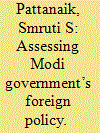

|
|
|
|
|
| Summary/Abstract |
‘Continuity’ has been a part of India’s foreign policy and a change in government can only bring in certain nuances in the conduct of that policy. The political environment that a new government brings in certainly creates some expectation from the government, but, any change in the foreign policy would be contingent upon a change in the strategic environment in which a state functions. Yet, the BJP led NDA government’s policy is keenly watched and there is an expectation that this government’s foreign policy would be different in style and direction, if not in substance.
|
|
|
|
|
|
|
|
|
|
|
|
|
|
|
|
| 7 |
ID:
135102


|
|
|
|
|
| Summary/Abstract |
The article documents the evolution of the structural dimension in South Korean foreign policy through a study of middle-power diplomacy in the post-2008 financial crisis period. This article argues that middle-power diplomacy, which propounds a global role for South Korea assuming leadership and substantially increasing international contribution is a paradigm shift in South Korean foreign policy posture, which until recently was limited to issues of the Korean peninsula. Through the middle power discourse South Korea projects its role in international affairs as a facilitator, interlocutor and norm entrepreneur focusing on international security, development and environment and is aims to create a space for Korean diplomatic entrepreneurism in the emerging international order.
|
|
|
|
|
|
|
|
|
|
|
|
|
|
|
|
| 8 |
ID:
135537
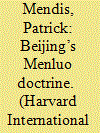

|
|
|
|
|
| Summary/Abstract |
Beijing has an incremental foreign policy in the South and East China Seas which appears to parallel America’s Monroe Doctrine. When the increasingly assertive young America declared that the Western Hemisphere was off-limits to the great colonial powers of Europe, President James Monroe’s eponymous doctrine altered the nature of trans-Atlantic relations. In retrospect, China is essentially following America’s footprints in trans-Pacifi c affairs with its own Ménluó (a transliteration of Monroe) Doctrine in the Asian Seas.
|
|
|
|
|
|
|
|
|
|
|
|
|
|
|
|
| 9 |
ID:
136714
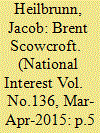

|
|
|
|
|
| Summary/Abstract |
Over the past five decades, beginning with his service to Richard Nixon and continuing to the present, Scowcroft has played a central role in promoting an internationalist foreign policy grounded in realist precepts.
|
|
|
|
|
|
|
|
|
|
|
|
|
|
|
|
| 10 |
ID:
135182


|
|
|
|
|
| Summary/Abstract |
As the world has become more interconnected, the need for coordinated responses to shared global public health threats has increased. A small but growing cadre of diplomats known as health attachés is key among the practitioners of global health diplomacy (GHD) who employ the tools of diplomacy and statecraft to bridge governments’ public health and foreign policy objectives.
|
|
|
|
|
|
|
|
|
|
|
|
|
|
|
|
| 11 |
ID:
136723


|
|
|
|
|
| Summary/Abstract |
George W. Bush portrayed himself as both his father’s son and his opposite. Jeb may be able to do something similar—present himself as both the next Bush and the new, improved Bush.
|
|
|
|
|
|
|
|
|
|
|
|
|
|
|
|
| 12 |
ID:
135122


|
|
|
|
|
| Summary/Abstract |
Edward Snowden’s June 2013 leak has shone unprecedented light on the dark underside of Internet connectivity. So far, however, Canada has remained a victim largely hidden in the shadows.
Much of the debate over the National Security Agency (NSA) revelations has focused on U.S. domestic surveillance of individuals never under suspicion. But whatever modest legal protections Americans may enjoy, all those outside the United States are classified as foreigners and have no such protection. And while we know most about the NSA’s domestic surveillance operations, the Snowden documents make very clear that with the aid of its allies—Great Britain, Canada, Australia, and New Zealand—the NSA has developed a globe-spanning surveillance infrastructure of remarkable scale and scope. Not surprisingly, the NSA has targeted countries regarded as “unfriendly” to American interests, such as China, Russia, and Iran, but the Agency has also been intercepting and analyzing the internal communications of countries generally regarded as “friendly” allies, such as Brazil, Denmark, Germany, France, India, Italy, Netherlands, Norway, Spain, and many more. The aptly named Boundless Informant program reported that in one month alone, the NSA’s Global Access Unit collected data on over 97 billion emails and 124 billion phone calls from nearly every country.
|
|
|
|
|
|
|
|
|
|
|
|
|
|
|
|
| 13 |
ID:
137400


|
|
|
|
|
| Summary/Abstract |
A basic trade-off in military cooperation exists: States must respond to the dominant ally’s demands and act as a reliable partner while simultaneously making a decision that is acceptable to domestic audiences. We argue that compensatory burden-sharing strategies are imperfect but dependable solutions to manage foreign policy decisions at the domestic and alliance levels. Our theoretical expectations are tested using the US-Japan and US-Republic of Korea alliances and, in particular, the contribution of each country to the war in Afghanistan. We find that foreign aid commitments to third parties are made as a form of compensation when alliance expectations are substantial, but the secondary ally's ability to contribute militarily is highly constrained. Foreign aid has therefore served as an alliance management tool.
|
|
|
|
|
|
|
|
|
|
|
|
|
|
|
|
| 14 |
ID:
136824


|
|
|
|
|
| Summary/Abstract |
It has been more than six month of Modi’s government where his energy policies are already being tested both in terms of foreign policy dimension with increased energy engagements with the outside world as well as with his domestic energy policies, which were often criticised as ineffective during the previous regimes, despite some opportunities which came through, but was lost due to domestic bureaucratic and political hurdles. This is particularly with respect to Indo-US Nuclear Deal grabbed during United Progressive Alliance (UPA) I. This deal is yet to see a light of a day.
|
|
|
|
|
|
|
|
|
|
|
|
|
|
|
|
| 15 |
ID:
136587
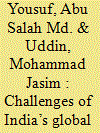

|
|
|
|
|
| Summary/Abstract |
India is emerging as a global economic power and expanding its military capabilities. Its maritime posture in the Indo-Pacific has made it an important stakeholder in the Asia-Pacific strategic ambiguity. The country is invited in almost all global forums and encouraged to play active role in the international affairs. These are some of the key indicators of India’s global emergence. By contrast, India is yet to take strong footholds in several global issues, while negotiating with international powers e.g. the USA and China. Some major challenges of the global emergence of India are its foreign policy predicaments, neighbourhood compulsions and China bogey, compulsions of energy import, limits of its soft power capabilities, internal security threats and domestic underdevelopment. In this context, the two important research questions of this paper are: which factors indicate India as an emerging global power? And, what are the challenges for India’s global emergence? The paper concludes that due to emerging economic and military power, India’s role in the international arena are increasing, but the country faces both internal and external challenges to project itself as a global power.
|
|
|
|
|
|
|
|
|
|
|
|
|
|
|
|
| 16 |
ID:
136328


|
|
|
|
|
| Summary/Abstract |
The Asia-Pacific region has evolved in to a main battlefield of international strategic rivalry. Tensions are escalating in China’s surrounding areas. China should strike a dynamics balance between defending its legitimate rights and ensuring regional stability by seizing the strategic initiative in managing crises and conflicts on the basis of stabilizing foreign relations and pressing on with international cooperation.
|
|
|
|
|
|
|
|
|
|
|
|
|
|
|
|
| 17 |
ID:
135932
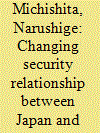

|
|
|
|
|
| Summary/Abstract |
Japan has long played the role as the main operating base for Korean contingencies. It has also provided rear-area logistic support to the US forces fighting in Korea and helped South Korea build up its defense industrial base. However, the Japan-South Korea relationship has deteriorated in recent years due to short-term political and long-term economic and strategic reasons. At this point, South Korea is bandwagoning with China and deemphasizing its relationship with Japan. China-South Korea relations are not without problems, however, and Japan regards South Korea as one of the most important potential strategic partners in maintaining stability in Asia. In the future, the most decisive factor in determining the direction of the security relationship between Japan and South Korea will be China.
|
|
|
|
|
|
|
|
|
|
|
|
|
|
|
|
| 18 |
ID:
134698


|
|
|
|
|
| Summary/Abstract |
The negotiations to create the U.N. Human Rights Council provided the Chinese government with opportunities to influence the design of the new body. China was unable to gain the necessary support to restrict the introduction of country-specific resolutions, but it received much support elsewhere without needing to use either coercion or inducement
|
|
|
|
|
|
|
|
|
|
|
|
|
|
|
|
| 19 |
ID:
134993
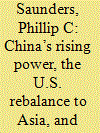

|
|
|
|
|
| Summary/Abstract |
The Obama administration’s “rebalance to Asia” has many elements of continuity with past policy, including recognition that rapid growth and economic dynamism have greatly expanded the Asia-Pacific region’s economic and strategic weight and importance to U.S. interests. Administration officials emphasize that the rebalance involves a comprehensive diplomatic, economic, and military approach that pays more attention to India, Southeast Asia, and regional institutions; that the timing was dictated largely by the need for clear priorities to guide force development in an era of declining spending; and that demand by U.S. allies and partners for an increased U.S. commitment to the region played an important role in shaping the rebalance. U.S. diplomatic, economic, and military efforts to implement the rebalance demonstrate a significant increase in strategic attention to the Asia-Pacific region, matched by commitments of diplomatic, economic, and military resources, including the time of senior U.S. leaders. Chinese officials and scholars have reacted by expressing concern and skepticism about the stated U.S. rationale, lamenting the “lack of strategic trust” between Washington and Beijing, urging greater respect for Chinese “core interests,” and stressing negative consequences of the rebalance for Asian security (especially its supposed role in emboldening U.S. allies and partners to challenge Chinese maritime territorial claims). At the same time, they have redoubled efforts to stabilize Sino-U.S. relations and to build a “new type of great power relations.” A key implementation challenge is making the rebalance robust enough to reassure U.S. allies and partners of the U.S. capability and will to maintain its presence in Asia over the long-term, while not alarming Chinese leaders to the point where they forego cooperation with Washington. U.S. and Chinese leaders should work to expand and deepen the scope of bilateral cooperation on common interests, while seeking ways to limit and manage competitive aspects of U.S.-China relations.
|
|
|
|
|
|
|
|
|
|
|
|
|
|
|
|
| 20 |
ID:
137383


|
|
|
|
|
| Summary/Abstract |
Though the build-up of China's blue-water fleet is causing consternation in foreign-policy circles, the country's on-going expansion into Russia and the former Soviet Union has scarcely garnered comment. For the past decade, China has used its foreign reserves to acquire strategic assets (principally infrastructure and natural resources) and tracts of sovereign territory along its existing borders and increasingly further afield. The impact on targeted countries (and, in turn, their own foreign policy) is extreme, with serious implications for security and economics far beyond their borders. This article provides an overview of China's acquisitions and investments in Eurasia, followed by more detailed discussion of recent developments and responses in Central Asia, Ukraine and Mongolia, and Siberia. It then looks at the impact of China's actions on Sino-Russian relations, discusses the importance of Russia and Central Asia as a resource corridor and buffer zone between Europe and China, and suggests how these manoeuvrings might result in long-term benefits for China.
|
|
|
|
|
|
|
|
|
|
|
|
|
|
|
|
|
|
|
|
|